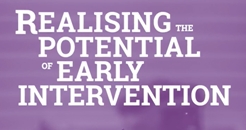 Realising the potential of early intervention
Realising the potential of early intervention
From a report by the Early Intervention Foundation
The Early Intervention Foundation recently published a report which sets out a plan of action for Government to ensure effective early intervention is available to the children, young people and families who need it most.
Early intervention is as pertinent to societal concerns today – rising health and social inequalities, mental health problems among children and young people, declining social mobility – as it ever was. The report gives some insights into how early intervention can help in at least four domains:
1. Physical development
Physical development involves children’s physical health, maturation and the presence or absence of a physical disability. Children’s physical wellbeing provides the basis for positive development across all other psychological and intellectual domains.
2. Cognitive development
Cognitive development includes children’s acquisition of speech and language skills, the ability to read and write, numeracy capabilities and logical problem-solving. Children’s cognitive development is highly associated with success in school and entry into the workforce. It is also associated with self-esteem and mental wellbeing throughout childhood and adolescence, as well as a variety of physical health outcomes during adulthood.
3. Behavioural development
Behavioural development involves children’s ability to monitor and regulate their own behaviour, their attention and their impulses. Children’s self-regulatory skills are highly associated with their ability to form positive relationships with others, as well as their success in school. Behavioural difficulties during childhood are highly predictive of children’s involvement in criminal activity during the teenage years and adulthood.
4. Social & emotional development
Social and emotional development is the process by which children acquire the knowledge and skills to understand and manage their emotions, set and achieve positive goals, feel and show empathy for others, establish and maintain positive relationships, and make responsible decisions. Social and emotional development is highly associated with children’s ability to form positive relationships with others and with a reduced risk of depression and other poor mental health outcomes.
Funding pressures mean councils are struggling to maintain early help and wider preventative services. Questions are being asked about what early intervention can realistically be expected to achieve against a backdrop of rising demand for support and growing concerns about childhood vulnerability. The report highlights significant barriers within the current system that inhibit the potential of early intervention, and a set of key actions – four at the national level, two at the local level – that are required to really push this agenda forward.
While the case for early intervention is strong, the way ahead is not yet secure or mapped out.
Watch this 2 minute video:
Read the report here.
In my view, the report focuses too much on assumed state-based action and does not explore the actions other actors in a community can take. This thinking needs to be developed.
Retweet about this article:
From a report by Early Intervention Foundation, 28/11/2018